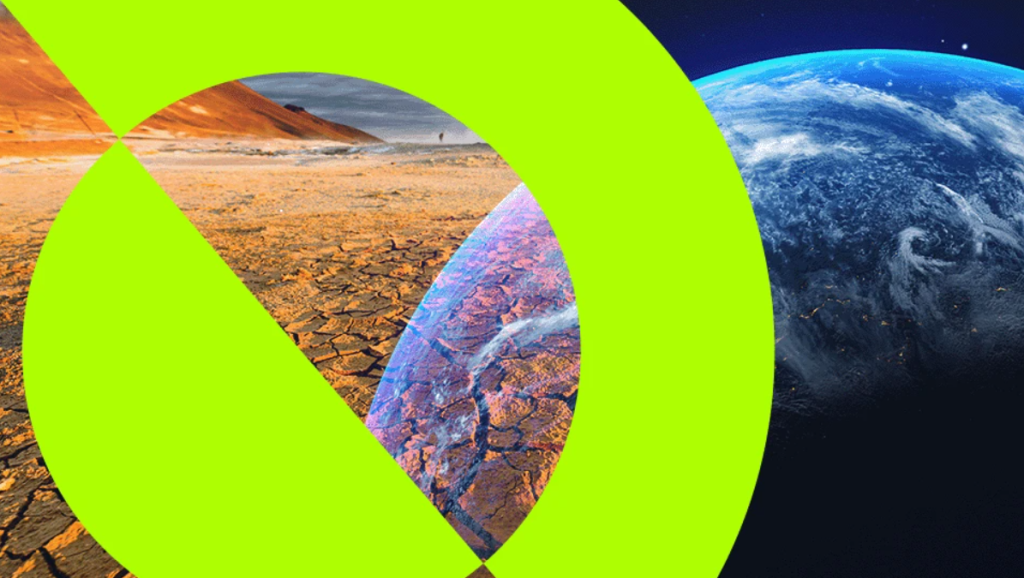Human activities are causing world temperatures to rise, posing serious threats to people and nature.
Things are likely to worsen in the coming decades, but scientists argue urgent action can still limit the worst effects of climate change.
What is climate change?
Climate change is the long-term shift in the Earth’s average temperatures and weather conditions.
The world has been warming up quickly over the past 100 years or so. As a result, weather patterns are changing.
Between 2015 and 2024, global temperatures were on average around 1.28C above those of the late 19th Century, according to the European Copernicus climate service, external.
Since the 1980s, each decade has been warmer than the previous one, the UK Met Office says.
The year 2024 was the world’s hottest on record, with climate change mainly responsible for the high temperatures.
It was also the first calendar year to surpass 1.5C of warming compared to pre-industrial levels, according to Copernicus.
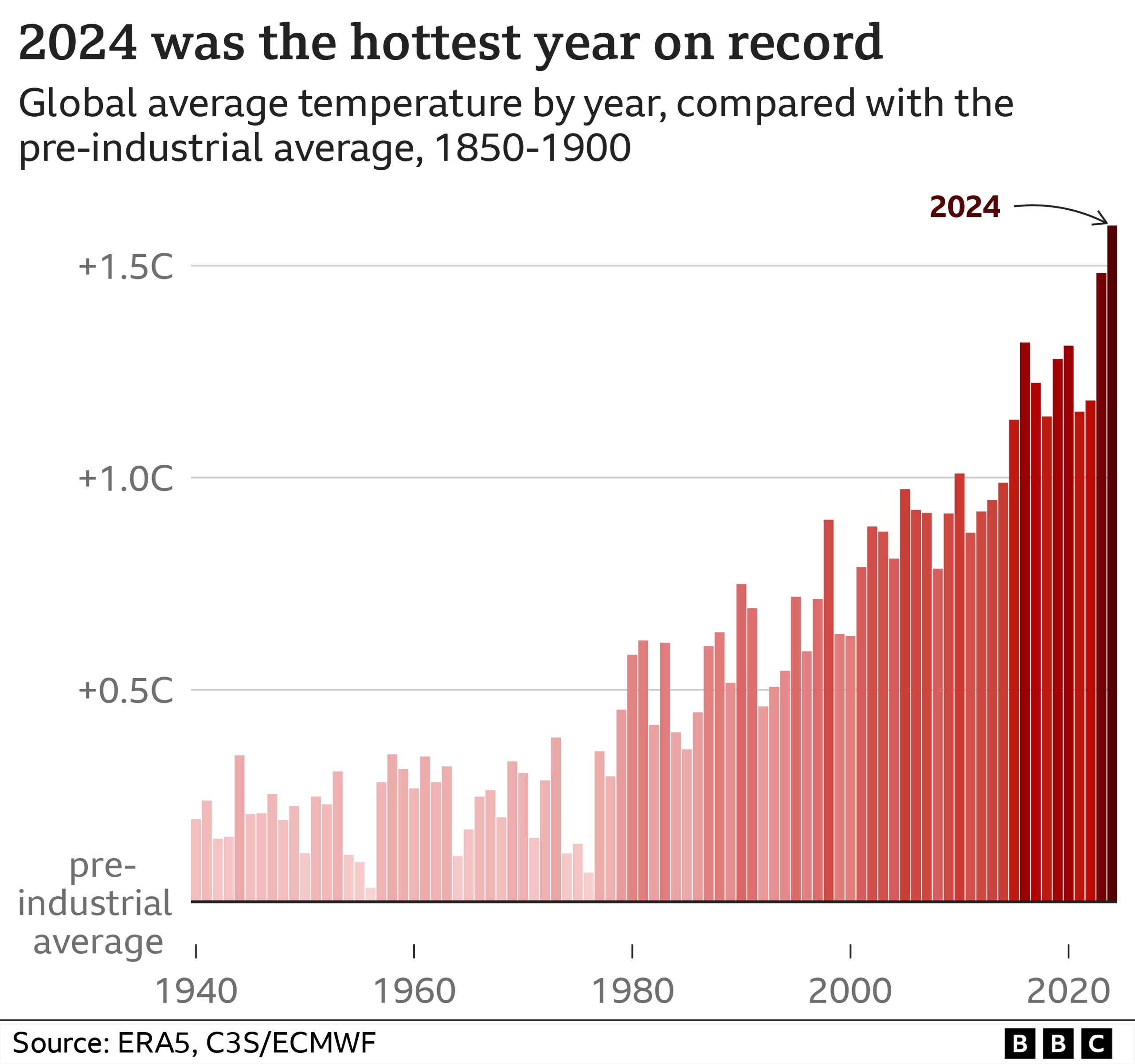
How are humans causing climate change?
The climate has changed naturally throughout the Earth’s history.
But natural causes cannot explain the particularly rapid warming seen over the last century, according to the UN’s climate body, the Intergovernmental Panel on Climate Change (IPCC).
This has been caused by human activities, in particular the widespread use of fossil fuels – coal, oil and gas – in homes, factories and transport systems.
When fossil fuels burn, they release greenhouse gases – mostly carbon dioxide (CO2). This CO2 acts like a blanket, trapping extra energy in the atmosphere near the Earth’s surface. This causes the planet to heat up.
Since the start of the Industrial Revolution – when humans started burning large amounts of fossil fuels – the amount of CO2 in the atmosphere has risen by about 50%, external, far above levels seen in the Earth’s recent history.
The CO2 released from burning fossil fuels, external has a distinctive chemical fingerprint. This matches the type of CO2 increasingly found in the atmosphere.
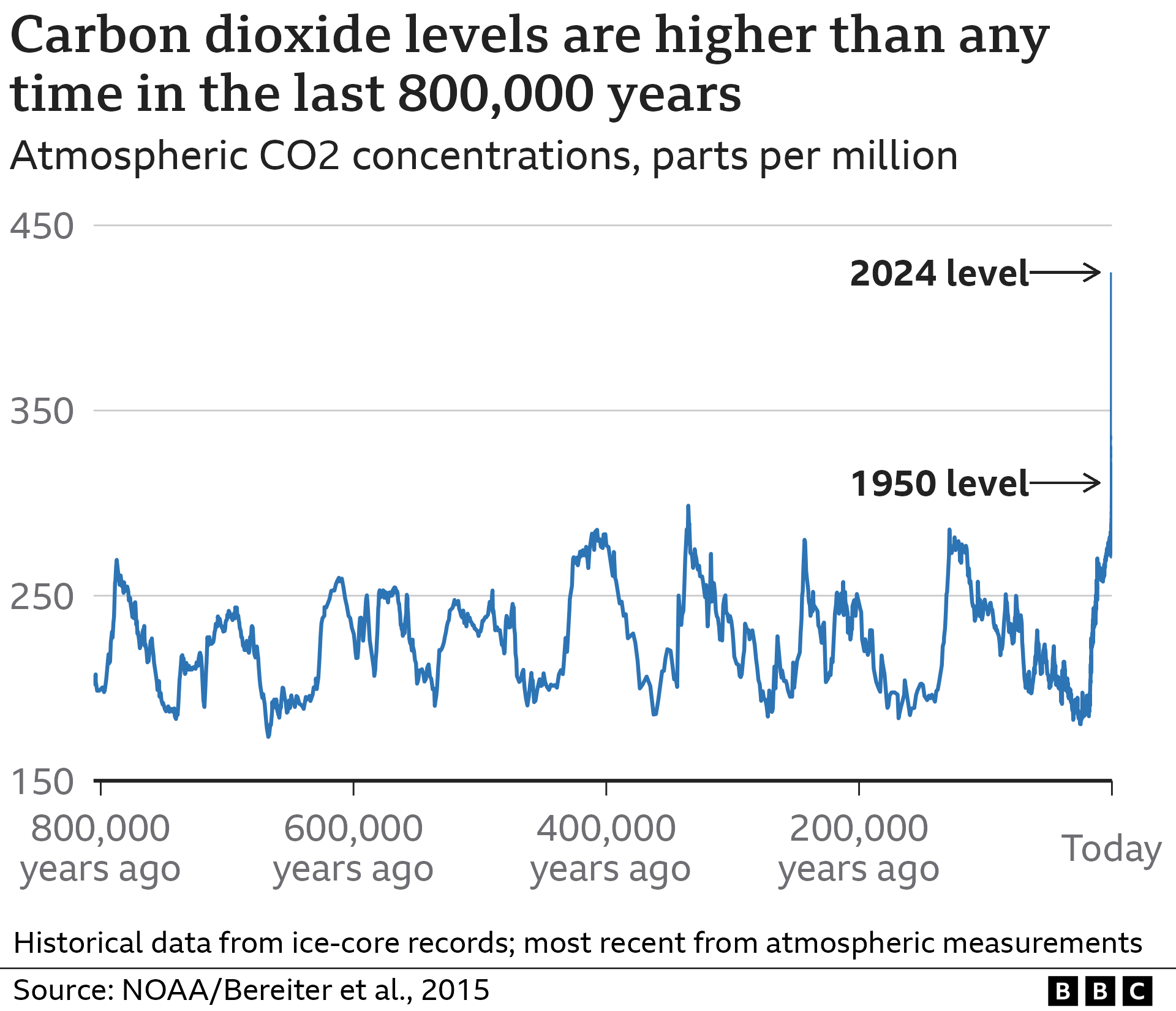
What effects of climate change have already been seen?
Climate change has already had a huge effect on the environment, including:
-
more frequent and intense extreme weather, such as heatwaves and heavy rainfall
-
rapid melting of glaciers and ice sheets, contributing to sea-level rise
-
huge declines in Arctic sea-ice
-
warmer oceans, which can fuel more intense storms and hurricanes and damage wildlife such as coral reefs
These changes are already having serious consequences for people and economies around the world.
For example, Hurricanes Helene and Milton – which hit parts of the US in September and October 2024 – could each end up costing at least $50bn (£40bn), external, according to provisional estimates.
More than 200 people were killed by Helene, and at least 16 by Milton.
The winds and rain from both storms were worsened by climate change, according to scientists at the World Weather Attribution (WWA) group.
Back in 2022, parts of East Africa suffered their worst drought for 40 years, putting more than 20 million people at risk of severe hunger.
Climate change has made droughts like this at least 100 times more likely, the WWA says.
The particular vulnerabilities of individual communities across the globe determine who is affected by these extreme events, and how badly.
Why does 1.5C matter and how will future climate change affect the world?
The more the world warms, the worse the impacts of climate change become.
Limiting long-term average temperature rises to 1.5C is seen as particularly important.
In a landmark agreement signed in Paris in 2015, almost 200 countries pledged to try to curb global warming to that amount. The reference to 1.5C is generally understood to mean a 20-year average, rather than an increase seen in any single year.
The science is not completely certain, but according to the UN, the consequences of 2C global warming versus 1.5C could include, external:
-
extreme hot days could become on average 4C warmer at mid-latitudes (regions outside the poles and tropics), versus 3C at 1.5C
-
sea-level rise could be around 0.1m higher than at 1.5C, exposing up to 10 million more people to events including more frequent flooding
-
more than 99% of coral reefs could be lost, compared with 70-90% at 1.5C
-
twice the number of plants and vertebrates (animals with a backbone) could be exposed to unsuitable climate conditions across more than half their geographical area
-
several hundred million more people may be exposed to climate-related risks and susceptible to poverty by 2050 than at 1.5C.
The call to restrict temperature rise to 1.5C was partly designed to avoid crossing so-called “tipping points”.
It is not clear exactly where they sit, but once these thresholds are passed, changes could accelerate and become irreversible, such as the collapse of the Greenland Ice Sheet.
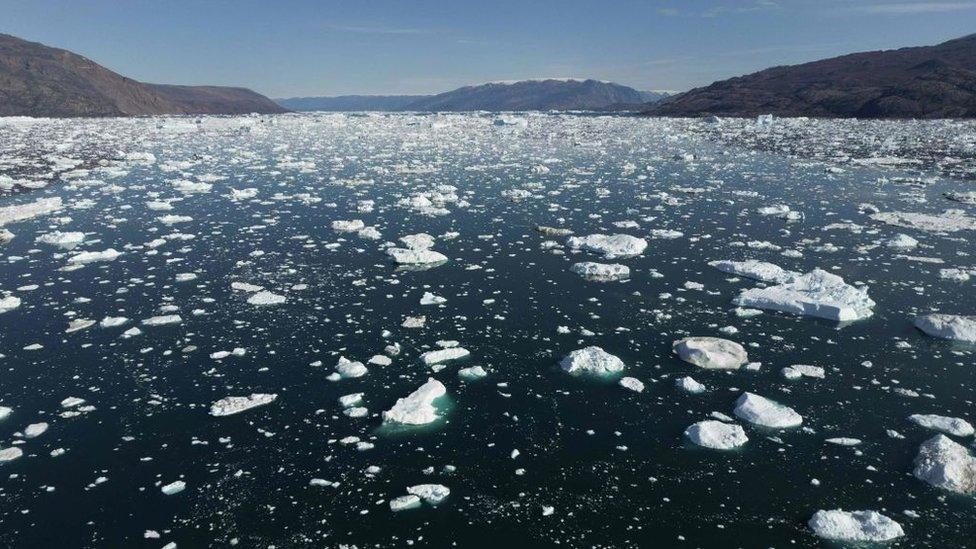
The Earth’s poles are especially vulnerable to rising temperatures
About 3.3 to 3.6 billion people are highly vulnerable to climate change, according to the IPCC.
People living in poorer countries are expected to suffer most as they have fewer resources to adapt.
This has led to questions about fairness, because these places have typically only been responsible for a small percentage of greenhouse gas emissions, external.
However, knock-on impacts could be felt over wide areas. For example, crop failures linked to extreme weather could raise global food prices.
What are governments doing about climate change?
To help keep global warming to the 1.5C limit agreed in Paris in 2015, CO2 emissions need to be “net zero” by 2050, the UN says.
This means reducing greenhouse gas emissions as much as possible, and actively removing any remaining emissions from the atmosphere.
Most countries have, or are considering, net zero targets, external.
However, greenhouse gas levels are still rising quickly and the world is “likely” to warm beyond 1.5C, the IPCC says.
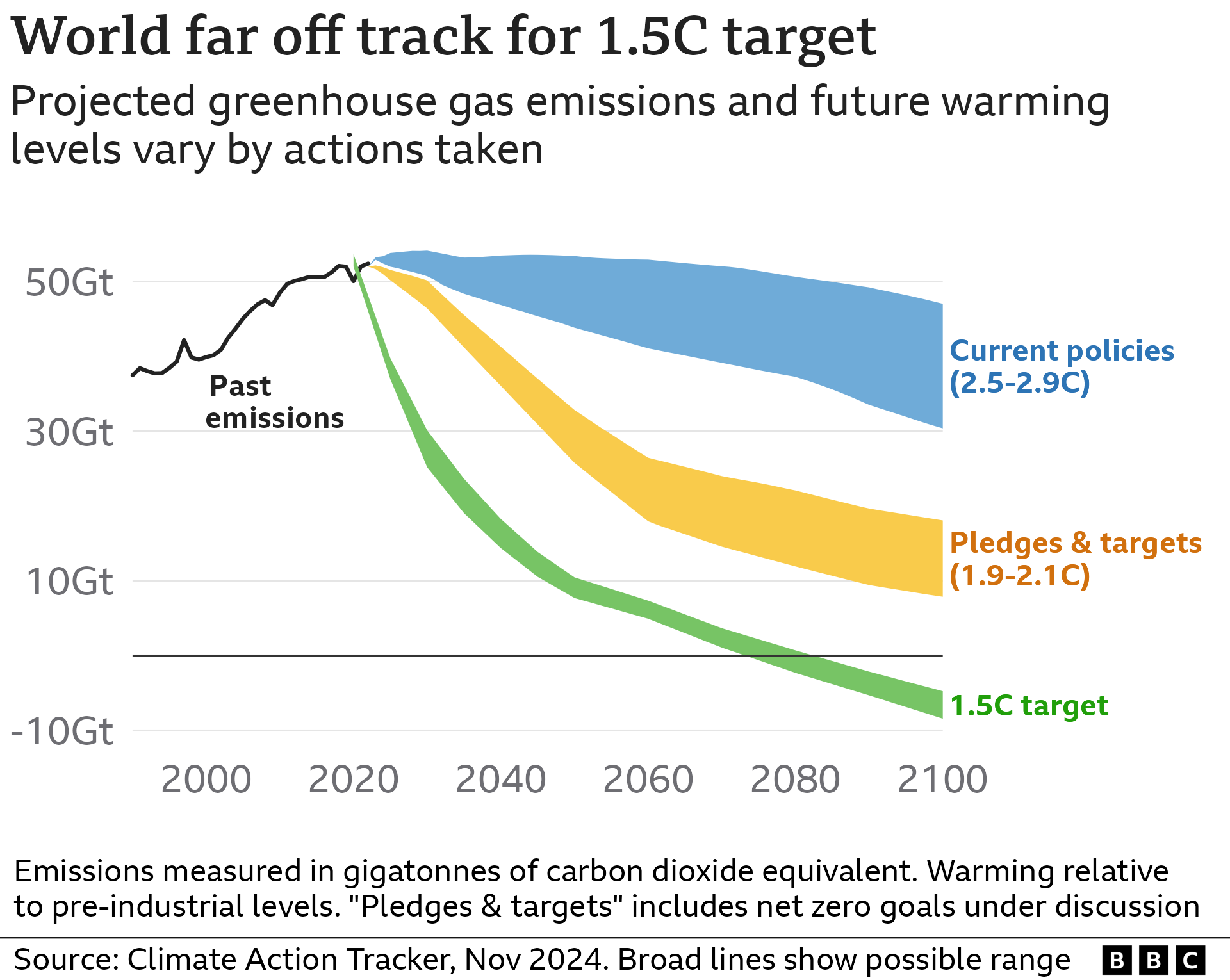
However, there has been progress in some areas, such as the growth of renewable energy and electric vehicles.
World leaders meet every year to discuss their climate commitments.
At the most recent COP29 summit in November 2024, richer countries committed to giving developing nations at least $300bn (about £240bn) a year by 2035 to help them tackle climate change.
However, this is far less than the amount poorer countries say they need.
Many countries had also hoped that the deal struck in 2023 to “transition away from fossil fuels in energy systems” would be strengthened, but that did not happen.
What can individuals do about climate change?
Major changes need to come from governments and businesses, but individuals can also help through actions like:
-
taking fewer flights
-
improving their home’s insulation and energy efficiency
-
switching to electric vehicles or living car-free
-
replacing gas central heating with electric systems like heat pumps
-
eating less red meat
Source link : View Article
Author
-

The BBC is the world’s leading public service broadcaster. They create distinctive, world-class programmes and content which inform, educate and entertain millions of people in the UK and around the world. Established by a Royal Charter, the BBC is principally funded through the licence fee paid by UK households.

